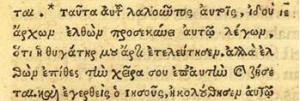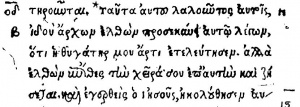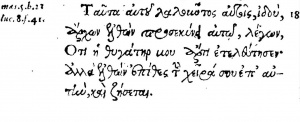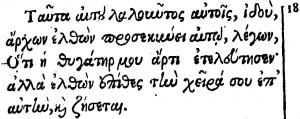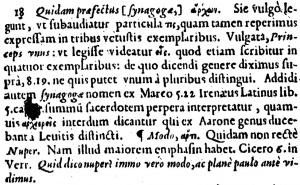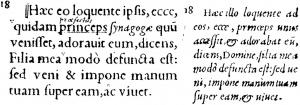Matthew 9:18
From Textus Receptus
(→Greek) |
|||
| Line 1: | Line 1: | ||
| - | [[ | + | * '''[[Matthew 9:18 Greek NT: Beza's Textus Receptus (1598)|ΚΑΤΑ ΜΑΤΘΑΙΟΝ 9:18]]''' |
| + | |||
| + | <small>''([[Textus Receptus (1598)|Textus Receptus]], [[Theodore Beza]], [[1598 AD|1598]])''</small> | ||
| + | |||
| + | * '''Matthew 9:18''' While he spake these things unto them, behold, there came a certain ruler, and worshipped him, saying, My daughter is even now dead: but come and lay thy hand upon her, and she shall live. | ||
| + | |||
| + | <small>''([[King James Version]], [[Pure Cambridge Edition]])''</small> | ||
| + | |||
| + | * '''[[Matthew 9:18 (TRV)|Matthew 9:18]]''' While He spoke these things to them, behold, a certain ruler came, and worshipped Him, saying, “My daughter has just died, but come and lay Your hand upon her, and she will live.” | ||
| + | |||
| + | <small>''([[Textus Receptus Version]])''</small> | ||
| + | |||
'''Matthew 9:18''' While he spake these things unto them, behold, there came a certain ruler, and worshipped him, saying, My daughter is even now dead: but come and lay thy hand upon her, and she shall live. | '''Matthew 9:18''' While he spake these things unto them, behold, there came a certain ruler, and worshipped him, saying, My daughter is even now dead: but come and lay thy hand upon her, and she shall live. | ||
| Line 59: | Line 70: | ||
[[Image:Matthew 9 18 Tyndale 1526.JPG|400px|thumb|right|[[Matthew 2:18]] in the [[1526 AD|1526]] [[Tyndale Bible]]]] | [[Image:Matthew 9 18 Tyndale 1526.JPG|400px|thumb|right|[[Matthew 2:18]] in the [[1526 AD|1526]] [[Tyndale Bible]]]] | ||
[[Image:Matthew 9 18 Coverdale 1535.JPG|400px|thumb|right|[[Matthew 2:18]] in the [[1526 AD|1526]] [[Coverdale Bible]]]] | [[Image:Matthew 9 18 Coverdale 1535.JPG|400px|thumb|right|[[Matthew 2:18]] in the [[1526 AD|1526]] [[Coverdale Bible]]]] | ||
| - | + | [[Image:Matthew 9.18 1611.JPG|300px|thumb|right|[[Matthew 9:18]] in the [[1611 AD|1611]] [[King James Version]]]] | |
* [[1395 AD|1395]] Whiles that Jhesus spak thes thingis to hem, lo! a prince cam, and worschipide hym, and seide, Lord, my douyter is now deed; but come thou, and putte thin hond on hir, and she schal lyue. ([[Wyclif's Bible]] by [[John Wycliffe]]) | * [[1395 AD|1395]] Whiles that Jhesus spak thes thingis to hem, lo! a prince cam, and worschipide hym, and seide, Lord, my douyter is now deed; but come thou, and putte thin hond on hir, and she schal lyue. ([[Wyclif's Bible]] by [[John Wycliffe]]) | ||
Revision as of 06:41, 1 April 2013
(Textus Receptus, Theodore Beza, 1598)
- Matthew 9:18 While he spake these things unto them, behold, there came a certain ruler, and worshipped him, saying, My daughter is even now dead: but come and lay thy hand upon her, and she shall live.
(King James Version, Pure Cambridge Edition)
- Matthew 9:18 While He spoke these things to them, behold, a certain ruler came, and worshipped Him, saying, “My daughter has just died, but come and lay Your hand upon her, and she will live.”
Matthew 9:18 While he spake these things unto them, behold, there came a certain ruler, and worshipped him, saying, My daughter is even now dead: but come and lay thy hand upon her, and she shall live.
Greek
Textus Receptus
- 1514 Ταῦτα αὐτοῦ λαλοῦντος αὐτοῖς· ἰδού ἄρχων εἷς ἐλθὼν προσεκύνει αὐτῷ λέγων ὅτι / Ἡ θυγάτηρ μου ἄρτι ἐτελεύτησεν· ἀλλὰ ἐλθὼν ἐπίθες / τὴν χεῖρά σου ἐπ' αὐτήν, καὶ ζήσεται· (Complutensian Polyglot)
- 1516 (Erasmus 1st)
- 1519 Ταῦτα αὐτοῦ λαλοῦντος αὐτοῖς, ἰδού ἄρχων ἐλθὼν προσεκύνει αὐτῷ λέγων, ὅτι Ἡ θυγάτηρ μου ἄρτι ἐτελεύτησεν· ἀλλὰ ἐλθὼν ἐπίθες τὴν χεῖρά σου ἐπ' αὐτήν, καὶ ζήσεται (Erasmus 2nd)
- 1522 Ταῦτα αὐτοῦ λαλοῦντος αὐτοῖς, ἰδού ἄρχων ἐλθὼν προσεκύνει αὐτῷ λέγων, ὅτι Ἡ θυγάτηρ μου ἄρτι ἐτελεύτησεν· ἀλλὰ ἐλθὼν ἐπίθες τὴν χεῖρά σου ἐπ' αὐτήν, καὶ ζήσεται (Erasmus 3rd)
- 1527 (Erasmus 4th)
- 1535 (Erasmus 5th)
- 1546 (Stephanus 1st)
- 1549 (Stephanus 2nd)
- 1550 Ταῦτα αὐτοῦ λαλοῦντος αὐτοῖς ἰδού, ἄρχων ἐλθὼν προσεκύνει αὐτῷ λέγων ὅτι Ἡ θυγάτηρ μου ἄρτι ἐτελεύτησεν· ἀλλὰ ἐλθὼν ἐπίθες τὴν χεῖρά σου ἐπ' αὐτήν, καὶ ζήσεται (Stephanus 3rd)
- 1551 (Stephanus 4th)
- 1565 Ταῦτα αὐτοῦ λαλοῦντος αὐτοῖς, ἰδού, ἄρχων ἐλθὼν προσεκύνει αὐτῷ, λέγων, ὅτι Ἡ θυγάτηρ μου ἄρτι ἐτελεύτησεν· ἀλλὰ ἐλθὼν ἐπίθες τὴν χεῖρά σου ἐπ' αὐτήν, καὶ ζήσεται (Beza 1st)
- 1565 (Beza Octavo 1st)
- 1567 (Beza Octavo 2nd)
- 1580 (Beza Octavo 3rd)
- 1582 (Beza 2nd)
- 1588 (Beza 3rd)
- 1590 (Beza Octavo 4th)
- 1598 Ταῦτα αὐτοῦ λαλοῦντος αὐτοῖς, ἰδού, ἄρχων ἐλθὼν προσεκύνει αὐτῷ, λέγων, ὅτι Ἡ θυγάτηρ μου ἄρτι ἐτελεύτησεν· ἀλλὰ ἐλθὼν ἐπίθες τὴν χεῖρά σου ἐπ' αὐτήν, καὶ ζήσεται Matthew 9:18 Beza 1598
- 1604 (Beza Octavo 5th)
- 1624 (Elzevir)
- 1633 (Elzevir)
- 1641 (Elzevir)
- 1841 Scholz)
- 1894 Ταῦτα αὐτοῦ λαλοῦντος αὐτοῖς, ἰδού, ἄρχων εἷς ἐλθὼν προσεκύνει αὐτῷ, λέγων, ὅτι Ἡ θυγάτηρ μου ἄρτι ἐτελεύτησεν· ἀλλὰ ἐλθὼν ἐπίθες τὴν χεῖρά σου ἐπ' αὐτήν, καὶ ζήσεται (Scrivener)
- 2000 (Byzantine/Majority Text)
Other Greek
- Ταῦτα αὐτοῦ λαλοῦντος αὐτοῖς ἰδοὺ ἄρχων εἰσελθὼν προσεκύνει αὐτῷ λέγων· ἡ θυγάτηρ μου ἄρτι ἐτελεύτησεν, ἀλλὰ ἐλθὼν ἐπίθες τὴν χεῖρά σου ἐπ’ αὐτήν, καὶ ζήσεται. (Tischendorf 8th Ed)
- 1881 Ταύτα αὐτοῦ λαλοῦντος αὐτοῖς ἰδοὺ ἄρχων [εἰς] προσελθὼν προσεκύνει αὐτῷ λέγων ὅτι ἡ θυγάτηρ μου ἄρτι ἐτελεύτησεν· ἀλλὰ ἐλθὼν ἐπίθες τὴν χεῖρα σου ἐπ’ αὐτὴν καὶ ζήσεται. (Westcott and Hort)
- Ταῦτα αὐτοῦ λαλοῦντος αὐτοῖς ἰδοὺ ἄρχων εἷς προσελθὼν προσεκύνει αὐτῷ λέγων ὅτι Ἡ θυγάτηρ μου ἄρτι ἐτελεύτησεν· ἀλλὰ ἐλθὼν ἐπίθες τὴν χεῖρά σου ἐπ’ αὐτήν καὶ ζήσεται. (Greek Orthodox)
Anglo Saxon Translations
- 1000 Ða þas þing to him spræc. þa genealæhte án ealdor & ge-eaðmedde hyne to him þus cweðende; Drihten min dohtor is dead; Ac cum & sete þine hand uppan hig & heo lyfað (Anglo-Saxon Gospels Manuscript 140, Corpus Christi College by Aelfric)
- 1200 Þa he þas þing to heom spræc þa genehlahte an aldor & ge-eadmede hine þus cweðende. Drihten min dohter ys dead. Ac cum & sete þine hand up-on hyo & hye lefeð. (Anglo-Saxon Gospels Hatton Manuscript 38, Bodleian Library by unknown author)
English Translations
- 1395 Whiles that Jhesus spak thes thingis to hem, lo! a prince cam, and worschipide hym, and seide, Lord, my douyter is now deed; but come thou, and putte thin hond on hir, and she schal lyue. (Wyclif's Bible by John Wycliffe)
- 1526 Whyls he thus spake vnto them / Lo there cam certayne ruler / and worshipped hyme saynge : my dogther is deed allredy / but com and lay thy honde on her / and she shall live.(Tyndale Bible First Edition by William Tyndale)
- 1534 Whyls he thus spake vnto the beholde ther came a certayne ruler and worshipped him sayinge: my doghter is euen now deceased but come and lay thy honde on her and she shall live. (Tyndale Bible) by (William Tyndale)
- 1535 Whyle he thus spake vnto them, beholde there came a certayne ruler, and worshipped him, sayinge: My doughter is eue now deceased, but come and lay yi honde on her, and she shall liue. (Coverdale Bible)
- 1539 (Great Bible First Edition - Miles Coverdale)
- 1540 Whyle he thus spake vnto them, beholde, ther came a certayne ruler, & worshipped him, sayinge: my daughter is euen now diseased, but come and laye thy hand vpon her, & she shall lyue. (Great Bible Second Edition - Miles Coverdale)
- 1549 Whyles he thus spake vnto them, behold there came a certaine rueler, and worshipped him sayinge my doughter is euen now dyseased, but come and lay thy hand on her, and she shall lyue. (Matthew's Bible - John Rogers)
- 1560 (Geneva Bible) First Edition
- 1568 Whyle he spake these thynges vnto them, beholde, there came a certayne ruler, and worshypped hym, saying: My daughter is euen nowe dead, but come and lay thy hande vpon her, and she shall lyue. (Bishop's Bible First Edition)
- 1587 While hee thus spake vnto them, beholde, there came a certaine ruler, and worshipped him, saying, My daughter is nowe deceased, but come and laie thine hande on her, and shee shall liue. (Geneva Bible) by William Whittingham
- 1611 While hee spake these things vnto them, beholde, there came a certaine ruler and worshipped him, saying, My daughter is euen now dead: but come, and lay thy hand vpon her, and she shall liue. (King James Version)
- 1729 Whilst he thus entertain'd them, the ruler of the synagogue came and made his address to him, saying, my daughter is upon the point of death: but come and lay thy hand upon her, and she shall live. (Mace New Testament)
- 1745 While he spake these things unto them, behold there came a certain ruler and woshipped him, saying, That my daughter is now dead: but come and lay thy hand upon her, and she shall live. (Mr. Whiston's Primitive New Testament)
- 1769 While he spake these things unto them, behold, there came a certain ruler, and worshipped him, saying, My daughter is even now dead: but come and lay thy hand upon her, and she shall live. (King James Version - Benjamin Blayney)
- 1770 As He was speaking these things to them, behold there came a ruler and worshipped Him, saying, My daughter is at the point of death: but come, I pray Thee, and put thy hand upon her, and she shall live: (Worsley Version by John Worsley)
- 1790 While he spake these things to them, behold, a certain ruler coming worshipped him, saying, My daughter is just dead: but come and lay thine hand on her, and she shall live. (Wesley Version by John Wesley)
- 1795 As he was speaking these things to them, behold, there came a ruler, and prostrated himself before him, saying, My daughter hath just now died: but come and lay thine hand upon her, and she shall live. (A Translation of the New Testament from the Original Greek by Thomas Haweis)
- 1833 While he was speaking these things to them, behold, there came a certain ruler, and worshiped him, saying, My daughter is even now dead: but come and lay thy hand upon her, and she will live. (Webster Version - by Noah Webster)
- 1835 While he was speaking, a ruler came, and prostrating himself, said, My daughter is by this time dead; but come, and lay your hand upon her, and she will revive. (Living Oracles by Alexander Campbell)
- 1849 WHILE he spake these words with them, a certain chief came, drew near, worshipped him, and said, My daughter is now dead; but come, lay thy hand upon her, and she shall live! (Etheridge Translation by John Etheridge)
- 1850 (King James Version by Committee)
- 1851 And while he was thus discoursing with them a certain ruler came, drew near, worshipped him and said: My daughter is already dead, but come lay thy hand upon her, and she will live. (Murdock Translation)
- 1858 While he was saying these words to them, behold a ruler came and worshipped him, saying, My daughter is now dead, but come and put your hand on her and she shall live. (The New Testament Translated from the Original Greek by Leicester Sawyer)
- 1865 These of him speaking, of them, lo, a ruler certain coming prostrated to him, saying: That the daughter of me now is dead; but coming lay the hand of thee upon her, and she shall live. (The Emphatic Diaglott by Benjamin Wilson)
- 1865 While he was speaking these things to them, behold, there came a ruler, and bowed down to him, saying: My daughter just now died; but come and lay thy hand upon her, and she will live. (The New Testament of Our Lord and Savior Jesus Christ 1865 by American Bible Union)
- 1869 While he was thus speaking to them, lo! a certain ruler came in and bowed down before him, saying, My daughter just now died; but come and lay thy hand upon her, and she will live. (Noyes Translation by George Noyes)
- 1873 While he spake these things unto them, behold, there came a certain ruler, and worshipped him, saying, My daughter is even now dead: but come and lay thy hand upon her, and she shall live. (King James Version) by Frederick Scrivener)
- 1885 While he spake these things unto them, behold, there came a ruler, and worshipped him, saying, My daughter is even now dead: but come and lay thy hand upon her, and she shall live. (Revised Version also called English Revised Version - Charles Ellicott editor)
- 1890 As he spoke these things to them, behold, a ruler coming in did homage to him, saying, My daughter has by this died; but come and lay thy hand upon her and she shall live. (Darby Version 1890 by John Darby)
- 1898 While he is speaking these things to them, lo, a ruler having come, was bowing to him, saying that `My daughter just now died, but, having come, lay thy hand upon her, and she shall live.' (Young's Literal Translation by Robert Young)
- 1901 While he spake these things unto them, behold, there came a ruler, and worshipped him, saying, My daughter is even now dead: but come and lay thy hand upon her, and she shall live. (American Standard Version - Philip Schaff)
- 1902 While, these things, he was speaking unto them, lo! a [certain] ruler, came, and began bowing down to him, saying,––My daughter, just now died! But come, and lay thy hand upon, her, and she shall live. (The Emphasised Bible Rotherham Version)
- 1902 And He speaking these things to them, behold a certain ruler having come, continued to worship Him, saying, My daughter just now died: but having come put your hand on her, and she shall live. (Translation of the New Testament from the Original Greek by William Godbey)
- 1904 While He is speaking these things to them, behold, a ruler, having come to Him, was worshiping Him, saying, "My daughter just now died; but, coming, lay Thy hand upon her, and she shall live." (The New Testament: Revised and Translated by Adolphus Worrell)
- 1904 While Jesus was saying this, a President of a Synagogue came up and bowed to the ground before him. "My daughter," he said, "has just died; but come and place your hand on her, and she will be restored to life." (Twentieth Century New Testament by Ernest Malan and Mary Higgs)
- 1911 (Syrus Scofield)
- 1912 While He was thus speaking, a Ruler came up and profoundly bowing said, "My daughter is just dead; but come and put your hand upon her and she will return to life." (Weymouth New Testament)
- 1918 While he was speaking these things to them, behold, a ruler came in and worshipped him, saying: My daughter just now died; but come and lay thy hand on her, and she shall live. (The New Testament Translated from the Sinaitic Manuscript by Henry Anderson)
- 1923 Just as he said this to them, an official came up and bowing low before him said to him, "My daughter has just died. But come! Lay your hand on her and she will come to life!" (Edgar Goodspeed)
- 1995 (New American Standard Bible) NASB (©1995)
- (BBE)
- (Holman Christian Standard Bible)
- (21st Century King James Version)
- (Common English Bible)
- (GOD’S WORD Translation)
- (Contemporary English Version)
- (New Living Translation)
- (Amplified Bible)
- (The Message)
- (New International Reader's Version)
- (Wycliffe New Testament)
Foreign Language Versions
Albabian
- Ndërsa Jezusi u thoshte këto, iu afrua një nga krerët e sinagogës, ra përmbys para tij, dhe i tha: Sapo më vdiq vajza, por eja, vëre dorën mbi të dhe ajo do të jetojë.
Armenian
- Երբ ան այս բաները կը խօսէր անոնց հետ, ահա՛ պետ մը եկաւ ու երկրպագեց անոր՝ ըսելով. «Աղջիկս թերեւս վախճանած է մինչեւ հիմա. բայց եկո՛ւր, դի՛ր ձեռքդ անոր վրայ, եւ պիտի ապրի»:
Arabic
وفيما هو يكلمهم بهذا اذا رئيس قد جاء فسجد له قائلا ان ابنتي الآن ماتت. لكن تعال وضع يدك عليها فتحيا. (Smith & Van Dyke)
Basque
- Gauça hauc hæy erraiten cerauztela, huná, iaun batec ethorriric adora ceçan hura, cioela, Ene alaba orain hil içan duc: baina ethorriric eçarrac eure escua haren gainean, eta vicico baita. (Navarro-Labourdin)
Bulgarian
- Когато им говореше това, ето, един началник дойде и им се кланяше, и казваше: Дъщеря ми току що умря; но дойди и възложи ръката Си на нея и тя ще оживее
Chinese
- Chinese Bible: Union (Simplified)
Croatian
- Dok im on to govoraše, gle, pristupi neki glavar, pokloni mu se do zemlje i reče: Kći mi, evo, umrije, ali dođi, stavi ruku na nju, i oživjet će.
Czech
- 1613 A když on toto k nim mluvil, aj, kníže jedno přistoupilo a klanělo se jemu, řka: Pane dcera má nyní umřela. Ale pojď, vlož na ni ruku svou, a budeť živa. Bible of Kralice Kralicka
Danish
- Medens han talte dette til dem, se, da kom der en Forstander og faldt ned for ham og sagde: "Min Datter er lige nu død; men kom og læg din Hånd på hende, så bliver hun levende."
Dutch
Finnish
- 1776 Kuin hän nämät heille puhunut oli, katso, niin päämies tuli ja kumarsi häntä, sanoen: nyt on minun tyttäreni kuolemallansa; mutta tule ja pane kätes hänen päällensä, niin hän virkoaa.
French
- 1744 (Martin)
- 1744 Comme il leur disait ces choses, voici venir un Seigneur qui se prosterna devant lui, en lui disant : ma fille est déjà morte, mais viens, et pose ta main sur elle, et elle vivra. (Ostervald)
- 1864 (Augustin Crampon)
- (Darby)
- 1910 Tandis qu'il leur adressait ces paroles, voici, un chef arriva, se prosterna devant lui, et dit: Ma fille est morte il y a un instant; mais viens, impose-lui les mains, et elle vivra. (Louis Segond)
German
- 1545 Da er solches mit ihnen redete, siehe, da kam der Obersten einer und fiel vor ihm nieder und sprach: HERR, meine Tochter ist jetzt gestorben; aber komm und lege deine Hand auf sie, so wird sie lebendig. (Luther)
- 1871 Während er dies zu ihnen redete, siehe, da kam ein Vorsteher herein und huldigte ihm und sprach: Meine Tochter ist eben jetzt verschieden; aber komm und lege deine Hand auf sie, und sie wird leben. (Elberfelder)
- 1912 Da er solches mit ihnen redete, siehe, da kam der Obersten einer und fiel vor ihm nieder und sprach: HERR, meine Tochter ist jetzt gestorben; aber komm und lege deine Hand auf sie, so wird sie lebendig. (Luther)
Hungarian
- Mikor ezeket mondá nékik, ímé egy fõember eljövén leborula elõtte, mondván: Az én leányom épen most halt meg; de jer, vesd reá kezedet, és megelevenedik.
Indonesian
Italian
- 1649 MENTRE egli ragionava loro queste cose, ecco, uno de’ capi della sinagoga venne, e gli s’inchinò, dicendo: La mia figliuola è pur ora trapassata; ma vieni, e metti la mano sopra di lei, ed ella viverà. (Diodati)
- 1927 Mentr’egli diceva loro queste cose, ecco uno dei capi della sinagoga, accostatosi, s’inchinò dinanzi a lui e gli disse: La mia figliuola è pur ora trapassata; ma vieni, metti la mano su lei ed ella vivrà. (Riveduta Bible)
Latin
See Also Matthew 9:18 Latin Versions
- haec illo loquente ad eos ecce princeps unus accessit et adorabat eum dicens filia mea modo defuncta est sed veni inpone manum super eam et vivet (Biblia Sacra Vulgata)
- 1514 hac illo loquente ad eos : ecce princeps unus accessit et adorabat eum dicēs. Dn̄e filia mea modo defuncta ē: sed veni inpone manū super eaz et vivet. Complutensian Polyglot
- 1516 (Erasmus)
- 1565 (Beza) See Also Matthew 9:18 Beza 1565
- 1598 (Beza)
Latvian
- Kamēr Viņš to runāja tiem, lūk, kāds priekšnieks atnāca un pielūdza Viņu, sacīdams: Kungs, mana meita tikko nomira, bet nāc, uzliec viņai savu roku, un tā dzīvos!
Lithuanian
- Jam taip bekalbant, prisiartino vienas vyresnysis, pagarbino Jį ir tarė: “Ką tik mirė mano dukrelė. Bet ateik, uždėk ant jos ranką, ir ji atgis”.
Maori
- I a ia e korero ana i enei mea ki a ratou, na ka haere mai tetahi rangatira, ka koropiko ki a ia, ka mea, Tenei kua marere taku tamahine: otira mau e haere ake, e whakapa tou ringa ki a ia, a ka ora.
Norwegian
- Mens han talte dette til dem, se, da kom en synagoge-forstander og falt ned for ham og sa: Min datter er nettop død; men kom og legg din hånd på henne, så vil hun leve.
Polish
- (Biblia Gdanska)
Portugese
- Enquanto ainda lhes dizia essas coisas, eis que chegou um chefe da sinagoga e o adorou, dizendo: Minha filha acaba de falecer; mas vem, impõe-lhe a tua mão, e ela viverá.
Romanian
Russian
- 1876 Когда Он говорил им сие, подошел к Нему некоторый начальник и, кланяясь Ему, говорил: дочь моя теперь умирает; но приди, возложи на нее руку Твою, и она будет жива. (Russian Synodal Version)
- Russian Transliteration of the Greek
- (Church Slavonic)
- 1917 Russian Synodal Version (Orthodox Synodal Edition)
Spanish
See Also Bible translations (Spanish)
- 1569 Hablando él estas cosas a ellos, he aquí vino un principal, y le adoró, diciendo: Mi hija acaba de morir; mas ven y pon tu mano sobre ella, y vivirá. (Reina-Valera)
- 1909 Hablando él estas cosas á ellos, he aquí vino un principal, y le adoraba, diciendo: Mi hija es muerta poco ha: mas ven y pon tu mano sobre ella, y vivirá. Biblia Reina-Valera, Revisión
- 1987 Translation from English. Publisher: Watch Tower Bible and Tract Society.
- 1994 Nuevo Testamento versión Recobro
- 1997 (La Biblia de las Américas) (©1997)
- 1999 Nueva Versión Internacional (NVI)
- 2009 Santa Biblia: Reina-Valera
Swahili
- Yesu alipokuwa akisema hayo, ofisa mmoja Myahudi alifika, akamwinamia na kusema, "Binti yangu amekufa sasa hivi. Lakini, tafadhali njoo umwekee mkono wako naye ataishi."
Swedish
- 1917 Medan han talade detta till dem, trädde en synagogföreståndare fram och föll ned för honom och sade: »Min dotter har just nu dött, men kom och lägg din hand på henne, så bliver hon åter levande.
Tagalog
- 1905 Samantalang sinasalita niya ang mga bagay na ito sa kanila, narito, dumating ang isang pinuno, at siya'y sinamba, na nagsasabi, Kamamatay pa lamang ng aking anak na babae: datapuwa't halina at ipatong mo ang iyong kamay sa kaniya, at siya'y mabubuhay. (Ang Dating Biblia)
Turkish
- İsa onlara bu sözleri söylerken bir havra yöneticisi gelip Onun önünde yere kapanarak, ‹‹Kızım az önce öldü. Ama sen gelip elini onun üzerine koyarsan, dirilecek›› dedi.
Thai
(Thai KJV)
Ukrainian
- Говорить Він їм се, аж ось приходить один старшина, і, вклонившись Йому, каже: Дочка моя тільки що скінчилась; та прийди положи на неї руку твою, то й оживе.
Scrivener
Scrivener claims that the KJV uses εἷς from the Complutensian Polyglot and the Vulgate.
He is making the claim that εἷς, which mean simple the number one, means "a certain" as in "a certaine" ruler
Erasmus in 1516 and 1522 do not have εἷς
Nor the 1550 or 1565 and 1598..
So bascially only the Complutensian has it as far as I can see. But why is it claimed that the KJV follows the Complutensian reading when the following English bibles have it without following any Greek with "εἷς":
1526 Lo there cam certayne ruler 1534 beholde ther came a certayne ruler 1535 beholde there came a certayne ruler 1540 beholde, ther came a certayne ruler 1549 behold there came a certaine rueler 1568 beholde, there came a certayne ruler 1587 beholde, there came a certaine ruler 1611 beholde, there came a certaine ruler
Green in his 1976 interlinear of Scrivener has "one" above "εἷς" but considers it unimportant and in the LITV Translation on the side has "..behold, coming up a ruler bowed before him.." So he leaves the εἷς untranslated. Zodhiates and the Online bible has εἷς meaning "a certain"

